The curative petition is the last chance available to the people or parties in the case after the review petition is dismissed or has been exhausted.
On May 5, 2021, the Supreme Court had struck down reservations for the Maratha community in colleges, higher educational institutions, and jobs, after noting that there was no valid ground to breach 50 per cent reservation while granting Maratha reservation.
Challenging the May 5 verdict, the Maharashtra government had filed a review petition, which was also dismissed by the top court on June 23, 2021. Thereafter, it filed the curative petition.
While rejecting the review plea, it had held, in a majority view, that the Centre alone was empowered to identify socially and educationally backward classes (SEBC) to include them in the Central List for claiming reservation benefits.
The top court had also refused to revisit its 1992 Indira Sawhney verdict which fixed the ceiling limit for reservation at 50 per cent.The apex court had struck down the findings of the Justice NG Gaikwad Commission which led to the enactment of the Maratha quota law and set aside the Bombay High Court verdict which had validated the Maharashtra State Reservation for Socially and Educationally Backward Classes (SEBC) Act of 2018.The High Court had, in June 2019, reduced the quantum of reservation for Marathas from the 16 per cent recommended by the Gaikwad Commission to 12 per cent in education and 13 per cent in employment. The top court had said that even the reduced percentages of reservations granted by the High Court were ultra vires.
A separate reservation for the Maratha community violates Articles 14 (right to equality) and 21 (due process of law), the apex court had held.







